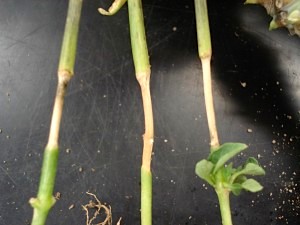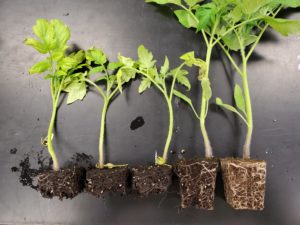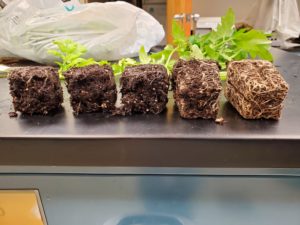Strawberry leaf spot, caused by the soil-borne fungal pathogen, Mycosphaerella fragariae, can infect leaves, petioles, runners, fruit stalks (pedicels), and berry caps or calyxes. Small, dark purple to reddish-purple, round spots, 1/8 to 1/4 inch in diameter (3 to 6 millimeters), appear on the upper leaf surfaces. The center of the spots soon become tan or gray and eventually almost white, while the broad margins remain dark purple. Later in the season, dark specks (sclerotia and/or perithecia) may be seen in the older lesions. Tannish areas form on the undersides of infected leaves. The symptoms on the other plant parts, except the fruit, are almost identical to those that develop on the upper leaf surface. [Read more…]
Vegetable Crops Edition
Seasonal updates and alerts on insects, diseases, and weeds impacting vegetable crops. New Jersey Commercial Vegetable Production Recommendations updates between annual publication issues are included.
Subscriptions are available via EMAIL and RSS.
Quick Links:
 NJ Commercial Vegetable Production Recommendations
NJ Commercial Vegetable Production Recommendations
 Rutgers Weather Forecasting - Meteorological Information important to commercial agriculture.
Rutgers Weather Forecasting - Meteorological Information important to commercial agriculture.
Ag Community Invited to Join a Virtual DOH/DOL/NJDA “Ag Stakeholder Engagement Call” on May 25 at 2:00 p.m.
NJ Secretary of Agriculture Doug Fisher has shared this attached letter inviting the agricultural community to join a virtual “Ag Stakeholder Engagement Call” on May 25 at 2:00 p.m. Hosted by the Departments of Health, Labor and Agriculture, the Commissioners and Secretary will discuss NJ’s response to COVID-19, provide updates on mitigation efforts and guidance, provide science-based information on the COVID vaccines, and answer questions.
This is a virtual Microsoft Teams meeting
Join on your computer or mobile app: Click here to join the meeting
Or call in (audio only): +1 856-338-7074,,487903588# United States, Camden
Phone Conference ID: 487 903 588#
Find a local number | Reset PIN | Learn More | Meeting options
Avoid Sunscald Injury in Transplants
The weather has been relatively dry these past few weeks and temperatures are already beginning to warm up this week, thus we need to be cautious about sunscald developing on the stems of transplants, especially those being set onto black plastic mulch. With a little planning ahead potential losses to sunscald injury can reduced significantly.

Sunscald injury on stems of newly transplanted pepper seedlings caused by stems laying against edges of black plastic mulch on hot, sunny days.
A transplant coming straight out of the greenhouse and directly into the field has not been exposed to much direct sunlight. Add that with black plastic mulch and you have a lot of heat aim directly at the tender tissue of the transplant. All transplants should have some time to harden-off outside the greenhouse before going into the field, a day or two, is better than none at all, the longer the better if time and space allow.
Sunscald typically appears as the slow bleaching out of the stem that will typically appear only on one side. Often this starts to appear right where the stem meets the black plastic mulch. In many cases if the stem is touching the mulch, the sunburn will start there and the transplant will begin to fall over as if the stem was broken.
When transplanting, make sure the holes in the plastic are wide enough to keep the stem from coming into contact with it. In some cases growers will fill in the transplant hole with soil to help keep the transplant upright before between-row herbicides are applied. ‘Leggy’ transplants that lay across plastic mulch and even those transplanted onto bare ground are prone to sunscald injury.
Identifying and Controlling Early-Season Damping-off Pathogens
It is extremely important to know which pathogen is causing damping-off problems and which fungicide to properly apply. The key to controlling damping-off is being proactive instead of reactive. Always refer to the fungicide label for crop use, pathogens controlled, and application rates.
Damping-off is caused by a number of important vegetable pathogens and is very common during the spring. Damping-off can kill seedlings before they break the soil line (pre-emergent damping-off) or kill seedlings soon after they emerge (post-emergent damping-off). Common pathogens that cause damping-off include Pythium, Phytophthora, Rhizoctonia and Fusarium spp.
Control of damping-off depends on a number of factors. First, is recognizing the conditions which may be leading to the problem (i.e., weather/greenhouse growing conditions) and second, identifying the pathogen causing the problem.
Conditions Favoring Damping-off
Although all four pathogens are associated with damping-off, the conditions which favor their development are very different. In general, Phytophthora and Pythium are more likely to cause damping-off in cool, wet or overwatered soils that aren’t allowed to dry out due to cloudy weather or cooler temperatures. Conversely, Rhizoctonia and Fusarium are more likely to cause damping-off under warmer, drier conditions especially if plug trays are kept on the dry side to help reduce transplant growth. [Read more…]
Manage your transplant watering schedule
The weather this spring has been relatively normal to date. However, we have had some dry weather these past few weeks. Unfortunately, weather patterns can cause problems in transplant production, especially when it comes time for watering. Hot days may require more than one watering, and cloudy days may require no water. In either case, growers need to anticipate their transplant water needs without over or under estimating watering. Of course, other factors include the growing media and the plant itself. Lets focus on media, for example, growers using a lighter soilless media, these will dry out much quicker than a heavier media and will require more daily watering (e.g., once in AM, afternoon, and evening). Growers using a heavier media may only have to water once a day, or early in the AM and maybe once more in the PM. Either type of media works fine as long as the weather doesn’t change and it fits the growers needs. Proper transplant watering is all about adjustment. If you have stuck to the same daily watering schedule this spring its very likely you have grossly over or under watered your transplants at some point. And, in all likelihood, grossly over or under watered trying to correct the situation. Uniformity is also key when it comes to proper transplant watering. If you find yourself spot watering out of schedule because some flats dry out quicker than others then most likely your uniformity is off. This is easily done when watering is done by hand with a wand. Poor uniformity can also be the result of transplant flats being set on uneven benches or uneven floors. Much like a field, low spots tend to collect the most water. All of this can lead to uneven transplant growth as well as disease and pest pressure, such as fungus gnat problems. If you are experiencing uneven transplant growth, then most likely your watering is uneven. For transplant growth to remain even, flats need to be watered each time to maximum water holding capacity, where each cell in the flat holds the maximum amount of water. An easy way to see this is to watch for water dripping out the bottom of the flat. As important, flats should also uniformly dry out. Below is an example of tomato transplants that have been pulled from the same flat. You can see the differences in plant height as well as root system formation as a result of uneven watering in a “heavy” soilless media. Cells that have remained on the wet side show poor growth and poor root system development because of a waterlogged cell; whereas cells that have been receiving the appropriate amount of water have much better growth and a nice root ball. The weight test. When was the last time you picked up a transplant tray? Picking up a transplant flat every once in a while will give you an idea of how well your watering schedule and uniformity is! Everyone has picked up a tray that has felt like it has the weight of a rock or the tray breaks apart because of the weight, or when you pick it up and it feels as light as a feather. Doing this is a good way to determine if your soilless media is “heavy” – holds more water than you think or if you have been overwatering on days you shouldn’t be or if you have not watered enough. Consistency is key when watering. Going from an extremely wet to an extremely dry transplant tray is not what you want for the transplant production season. You want consistent soil moisture as much as possible, thus proper transplant watering is all about the proper adjustments and knowing your media.

Differences in soil moisture across a single flat of tomato transplants.

Roots of tomato transplants in a flat that has irregular soil moisture.
Vegetable IPM Update 5/19/21
Sweet Corn
The black light trap network in New Jersey is now operational. To date, one corn earworm (CEW) at Green Creek (Cape May County), and several European corn borer (ECB) moths have been captured. As numbers increase, look for population maps of ECB, CEW, brown marmorated stink bug (BMSB) and CEW catches from pheromone traps in this weekly publication. The resulting full-state maps will include interpretive information.
The highest nightly trap catches of ECB for the week ending 5/19/21 are as follows:
| Centerton 1 | Jones Island 1 |
| Clinton 1 | Woodstown 1 |
